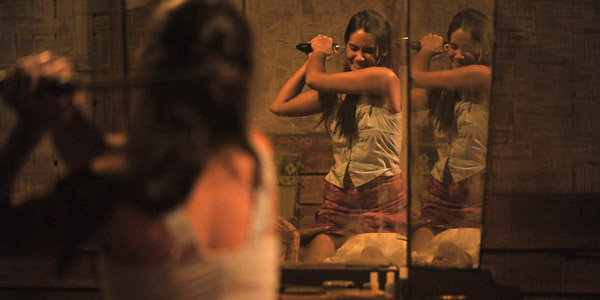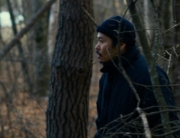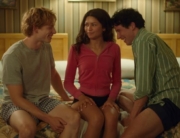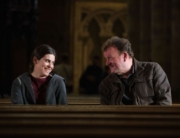![]() This is the feminist Western you should have been waiting for! There are nods to John Ford, Akira Kurosawa, Clint Eastwood, and a thrilling score redolent of Ennio Morricone. But by focusing on violent behavior and its impact on women, director Mouly Surya goes beyond making a genre film. She straddles tradition and modernity with a distinctive look and strong female characters in this instant classic set and filmed in Indonesia.
This is the feminist Western you should have been waiting for! There are nods to John Ford, Akira Kurosawa, Clint Eastwood, and a thrilling score redolent of Ennio Morricone. But by focusing on violent behavior and its impact on women, director Mouly Surya goes beyond making a genre film. She straddles tradition and modernity with a distinctive look and strong female characters in this instant classic set and filmed in Indonesia.
The isolated farmhouse on a windswept hill setting for “Act I: The Robbery” could be a scene from the 19th century. But the threatening figure approaching the gravestone in the front yard rides a motorcycle. The intentions of the scraggly old bandit, Markus (Egi Fedly), are as old as time. Brandishing a sword and a string instrument, he calmly and explicitly tells the lady of the house, Marlina (the magnificent Marsha Timothy), what’s going to happen to her and her livestock when the six men in his gang arrive. He taunts her about her debts and the wrapped mummy of her husband in the corner awaiting burial, settles in, and demands she cook chicken soup for the bandits’ dinner.
Claustrophobically filmed through doorways, Marlina bravely throws him a few retorts while she thinks hard on a plan. She cooks over the kitchen fire and hides red berries as the gang arrives around her. The youngest bandit, Franz (Yoga Pratama), also insults her before he’s sent off by his boss to grab all the livestock. She modestly serves the gang food and then quietly waits for their reaction to her cooking. When she goes into the bedroom to serve Markus his portion, he quickly smacks it away and rapes her. In her struggle, she finally grabs his sword.
In “Act II: The Journey,” Marlina is carrying Markus’s head in a sack, as “evidence for the police,” as she tells her chatty, very pregnant friend Novi (Dea Panendra) while they wait for a bus. (She has to threaten the driver with the sword to get on.) Amid all the onboard female bonding, Novi distracts the young thief Franz, who has come hunting for Marlina.
“Act III: The Confession” has wonderful sound design and imagery that is usually associated with male heroes, such as Marlina slowly riding a horse downhill into town. However, she is haunted by Markus’s headless ghost, and the notes of his stringed instrument reverberate through the shimmering heat in the oddly Texas-looking Sumba Island, with the electric guitar, rising vocals, and mournful trumpet of a spaghetti western. By “Act IV: The Birth,” the beaten-down Novi has ceased to be the comic distraction typical of a male action flick. Novi rises up and becomes a heroine herself, even while in labor.
The cinematography of Yunus Pasolang, Surya’s regular collaborator, deserves to be seen on the big screen; Caravaggio’s painting Judith Beheading Holofernes was their inspiration for the baroque palette and the static shots. Musicians Zeke Khaseli and Yudhi Arfani, who also worked with the director on her two earlier films, create and play on a varied, stirring score that establishes character leitmotifs and reinforces the Westerns theme of vengeance, without irony.
Marlina the Murderer in Four Acts will be on my list as one of the best foreign-language films of the year.







love your discussion of the music as well as the reference to my favorite rendering of Judith & Holofernes. Will have to see the movie. Thanks for an enticing review.